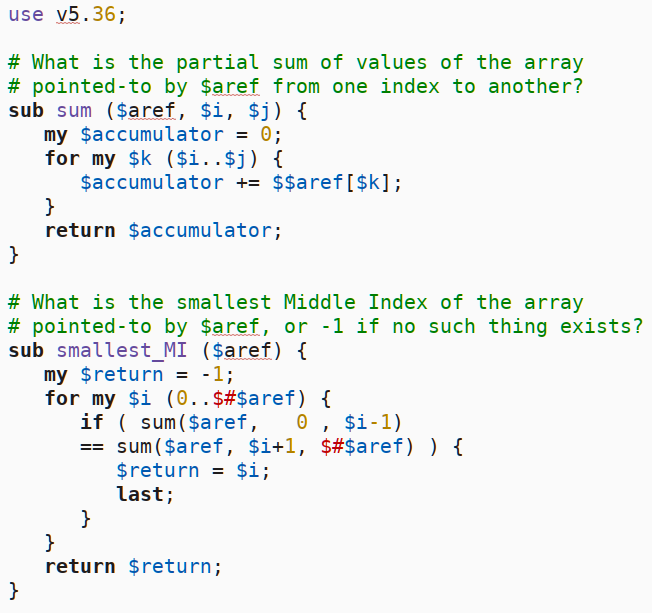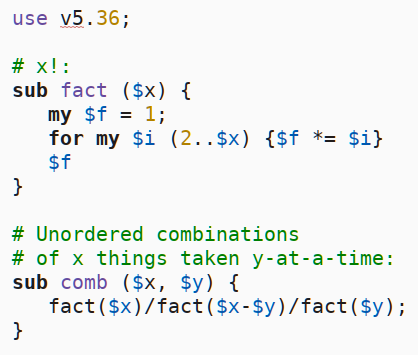Robbie Hatley's Solutions To The Weekly Challenge #291 (Middle Index and Poker)
For those not familiar with "The Weekly Challenge", it is a weekly programming puzzle with two parts, cycling every Sunday. You can find it here:
The Weekly Challenge for the week of 2024-10-13 through 2024-10-19 is #291.
The tasks for challenge #291 are as follows:
~~~~~~~~~~~~~~~~~~~~~~~~~~~~~~~~~~~~~~~~~~~~~~~~~~~~~~~~~~~~~~~~~ Task 291-1: "Middle Index" Submitted by: Mohammad Sajid Anwar You are given an array of integers, @ints. Write a script to find the leftmost middle index (MI) i.e. the smallest amongst all the possible ones. A "middle index" is an index where ints[0] + ints[1] + ... + ints[MI-1] == ints[MI+1] + ints[MI+2] + ... + ints[ints.length-1]. If MI == 0, the left side sum is considered to be 0. Similarly, if MI == ints.length - 1, the right side sum is considered to be 0. Return the leftmost MI that satisfies the condition, or -1 if there is no such index. Example 1: Input: @ints = (2, 3, -1, 8, 4) Output: 3 The sum of the numbers before index 3 is: 2 + 3 + -1 = 4 The sum of the numbers after index 3 is: 4 = 4 Example 2: Input: @ints = (1, -1, 4) Output: 2 The sum of the numbers before index 2 is: 1 + -1 = 0 The sum of the numbers after index 2 is: 0 Example 3: Input: @ints = (2, 5) Output: -1 There is no valid MI.
I'll start by making a variable "$return" and setting it to -1. Then I'll make an index variable $i, and increment it in a ranged for loop from 0 upwards to $#ints; if, for any index $i, the sum of values to its left is equal to the sum of values to its right, then set $return=$i and exit loop. Then just return $return.

Robbie Hatley's Perl Solution to The Weekly Challenge 291-1
~~~~~~~~~~~~~~~~~~~~~~~~~~~~~~~~~~~~~~~~~~~~~~~~~~~~~~~~~~~~~~~~~ Task 291-2: "Poker Hand Rankings" Submitted by: Robbie Hatley A draw poker hand consists of 5 cards, drawn from a pack of 52: no jokers, no wild cards. An ace can rank either high or low. Write a script to determine the following three things: 1. How many different 5-card hands can be dealt? 2. How many different hands of each of the 10 ranks can be dealt? See here for descriptions of the 10 ranks of Poker hands: https://en.wikipedia.org/wiki/List_of_poker_hands 3. Check the ten numbers you get in step 2 by adding them together and showing that they're equal to the number you get in step 1.
This problem involves a lot of thinking about how probability works. The solution will be heavily-dependent on the mathematical principle of "combinations", and thus also factorials. One could use CPAN module "Math::Combinatorics" for this, but factorials and combinations are so simple that I just rolled my own. The rest is just a matter of calculating "ways" to get each rank, then adding them together and showing that the sum is equal to 52c5 (the total number of combinations of 52 things taken 5-at-a-time).

Robbie Hatley's Perl Solution to The Weekly Challenge 291-2
That's it for challenge 291; see you on challenge 292!
Comments
Post a Comment